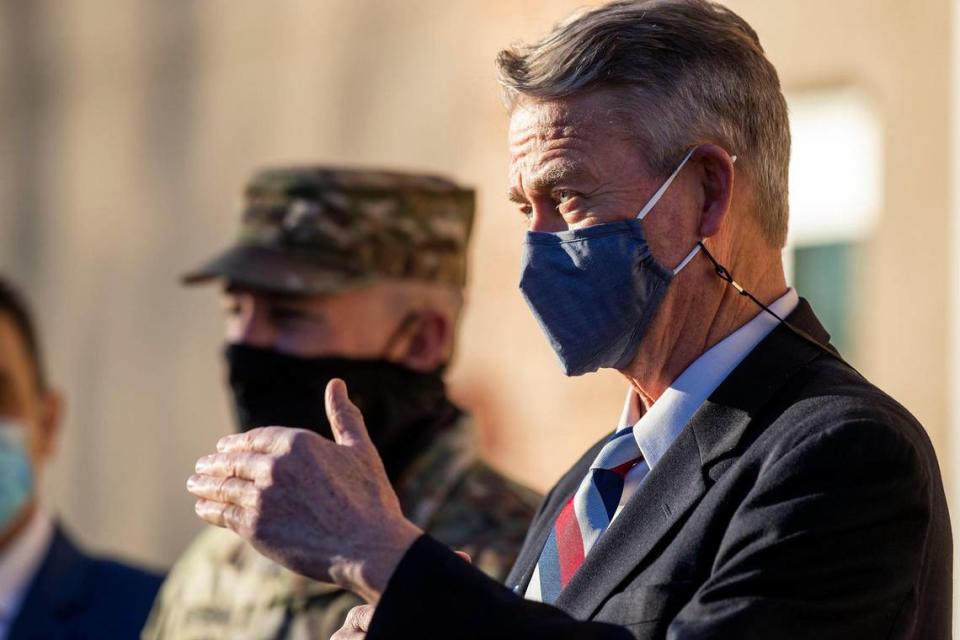Idaho Gov. Little says he’ll veto ‘irresponsible’ bills curbing his emergency powers

Idaho Gov. Brad Little says he will veto two bills passed by the Legislature that would curb the governor’s emergency powers.
Supported by former governors U.S. Sen. .Jim Risch, Butch Otter, Phil Batt and Dirk Kempthorne, Little said in a broadcast Friday that the bills are “irresponsible.” He said they would jeopardize the public safety of future generations and hinder governors’ ability to swiftly react to major disasters.
The bills add “more red tape and government bureaucracy” to decisions that should be made quickly, he said. Many stakeholders, including emergency managers and local jurisdictions, felt ignored throughout the process as Republican legislators pushed these bills through, Little said.
“Let’s be honest — these bills are an emotional, knee-jerk reaction, because of anger about the pandemic and some of my decisions during a very uncertain time last year,” Little said.
He defended his restrictions early on in the coronavirus pandemic.
Under the bills, the Idaho governor would still be able to declare a disaster. But if the disaster lasted longer than 60 days, he would be required to call the Legislature into session to approve extending the emergency. The governor would be able to extend declarations beyond 60 days only for the purpose of seeking federal funds.
Both the House and the Senate passed the bills — House Bill 135 and Senate Bill 1136 — with more than a two-thirds majority, enough support to override a veto. But Little urged state legislators to reconsider their votes. He urged members of the public with concerns to call their representatives.
House Republican leaders said in a joint statement that they will “continue to work for the people of Idaho.” The state’s laws were stress-tested during the pandemic, they said, and need to be fixed.
“This is simply an update to the system and not a commentary on the job performed by any elected official,” said Majority Caucus Chair Rep. Megan Blanksma, R-Hammett. “We still believe this legislation is important to appropriately balance the executive and legislative powers in Idaho, and it’s unfortunate that the current governor seems to take the issue so personally.”
Senate Republican leaders in a released statement said the governor chose to “take a narrow and negative interpretation” of the bills. Senate Majority Leader Kelly Anthon, R-Burley, said the legislation provides Idaho residents with local control and prevents a “dangerous precedent where a governor could unilaterally restrict individuals’ liberties.”
House Minority Leader Ilana Rubel, D-Boise, supported the governor’s decision.
“In emergencies, the speed of our response is a matter of life and death for Idahoans,” Rubel said in a statement. “It is critical that our executive branch can act swiftly and effectively, something that our legislative branch has not exactly modeled this session.”
Otter, who stood alongside Little in the remote broadcast, said the bills threaten Idaho’s response to any future calamities.
In remote testimony, Kempthorne also spoke against the measures and said they counter the Idaho Constitution, which grants the governor the power to respond to emergencies.
“When they do happen, and they do, somebody needs to take action and make the tough decisions,” Kempthorne said. “And it is the governor that’s required to do that in our constitution.”
Little also criticized lawmakers for steering away from their basic duties, which he said “have taken a back seat to fringe topics.” He said elected officials should work together to let the state “heal and move forward.”
Senators have recessed until Monday, because House members have fallen behind on approving state budgets.
“Anger has dominated the dialogue, and as a result, the real work people have sent us here to do is impacted,” Little said Friday. “Anger is the wrong reaction in these troubled times. ... It’s time to get back on track. The people of Idaho deserve our best.”
Rubel said she also hopes Little will veto a bill that would make it significantly more challenging to put a citizen-led initiative on the ballot.
“We hope that in addition to guarding the powers of the executive, however, that Gov. Little will protect the powers of the people he serves by vetoing SB1110, a bill that virtually eradicates citizens’ ballot initiative rights,” she said.

 Yahoo Movies
Yahoo Movies 